人教版高一英语必修一Unit6单元课后练习单元测试【精】
2024新教材高中英语Unit6AtOnewithNature单元测试外研版必修第一册
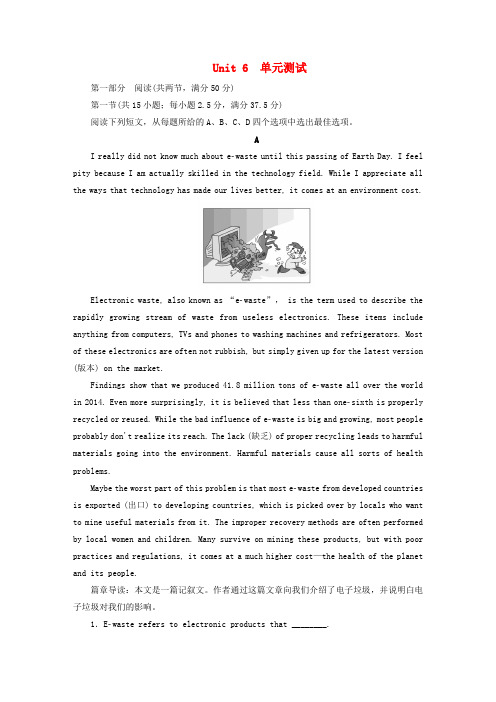
Unit 6 单元测试第一部分阅读(共两节,满分50分)第一节(共15小题;每小题2.5分,满分37.5分)阅读下列短文,从每题所给的A、B、C、D四个选项中选出最佳选项。
AI really did not know much about ewaste until this passing of Earth Day. I feel pity because I am actually skilled in the technology field. While I appreciate all the ways that technology has made our lives better, it comes at an environment cost.Electronic waste, also known as “ewaste”, is the term used to describe the rapidly growing stream of waste from useless electronics. These items include anything from computers, TVs and phones to washing machines and refrigerators. Most of these electronics are often not rubbish, but simply given up for the latest version (版本) on the market.Findings show that we produced 41.8 million tons of ewaste all over the world in 2014. Even more surprisingly, it is believed that less than onesixth is properly recycled or reused. While the bad influence of ewaste is big and growing, most people probably don't realize its reach. The lack (缺乏) of proper recycling leads to harmful materials going into the environment. Harmful materials cause all sorts of health problems.Maybe the worst part of this problem is that most ewaste from developed countries is exported (出口) to developing countries, which is picked over by locals who want to mine useful materials from it. The improper recovery methods are often performed by local women and children. Many survive on mining these products, but with poor practices and regulations, it comes at a much higher cost—the health of the planet and its people.篇章导读:本文是一篇记叙文。
Unit 6 Work quietly单元达标测试卷(含听力材料及答案)

Unit 6 Work quietly单元达标测试卷(一) 时间:60分钟满分:100分听力部分(30分)一、听录音, 选出你所听到的单词。
(每小题1分, 共5分) () 1. A. snow B. show C. sushi() 2. A. take B. talk C. turn() 3. A. weather B. whose C. where() 4. A. exercise B. exhibition C. else() 5. A. teach B. each C. teacher二、听录音, 选择与其相符的图片。
(每小题1分, 共5分) () 1. A. B.() 2. A. B.() 3. A. B.() 4. A. B.() 5. A. B.三、听录音, 选出你所听到的句子。
(每小题2分, 共10分)() 1. A. Keep to the right. B. Keep your desk clean. C. Keep your room clean.() 2. A. Work quietly! B. Talk quietly! C. Take turns!() 3. A. Can we use your crayons? B. Can we play music with you?C. Can we read the books here?() 4. A. I often cook noodles for my mother. B. I'm cooking noodles for my mother.C. I'll cook noodles for my mother.() 5. A. The Canadian robot is drawing a picture. B. The Spanish robot is playing music.C. The Chinese robot is doing kung fu.四、听问句选择正确的答语。
人教版高一英语必修第一册 Welcome Unit 单元测试题(含答案)
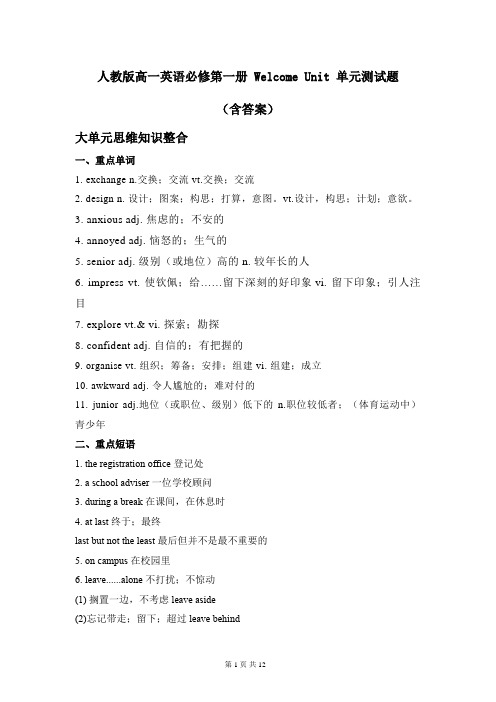
人教版高一英语必修第一册 Welcome Unit 单元测试题(含答案)大单元思维知识整合一、重点单词1. exchange n.交换;交流 vt.交换;交流2. design n. 设计;图案;构思;打算,意图。
vt.设计,构思;计划;意欲。
3. anxious adj. 焦虑的;不安的4. annoyed adj. 恼怒的;生气的5. senior adj. 级别(或地位)高的 n. 较年长的人6. impress vt. 使钦佩;给……留下深刻的好印象 vi. 留下印象;引人注目7. explore vt.& vi. 探索;勘探8. confident adj. 自信的;有把握的9. organise vt. 组织;筹备;安排;组建 vi. 组建;成立10. awkward adj. 令人尴尬的;难对付的11. junior adj.地位(或职位、级别)低下的n.职位较低者;(体育运动中)青少年二、重点短语1. the registration office 登记处2. a school adviser 一位学校顾问3. during a break 在课间,在休息时4. at last 终于;最终last but not the least 最后但并不是最不重要的5. on campus 在校园里6. leave......alone 不打扰;不惊动(1) 搁置一边,不考虑 leave aside(2)忘记带走;留下;超过 leave behind(3)动身去 leave for(4)遗漏,省去;忽视;冷落 leave out 7. fill in 填写8. find sb./sth +adj 发现某人/某事怎么样9. look forward to... 盼望;期待......(1)回顾,回忆起 look back on...(2)轻视,瞧不起 look down on...(3)仰慕,尊敬 look up to...(4)注意,当心,留意 look out for...10. at the same time 同时11. come true 实现12. come out 出现,出版,开花结果13. take notes 记笔记(1)做笔记,记录 take notes of ...(2)注意;留意 take note of...(3)交换意见 compare notes14. make plans 做计划15. write down 写下......16. either......or......不是......就是......17. be busy with sth /doing sth 忙于做某事18. show sth to sb 给某人展示某物三、重点句型1. make it+adj./n.+(for sb.) to do sth.2. recommend that ... (should) do3. so that引导目的状语从句4. 疑问词+to do四、重点用法1. What if......? 要是......会怎么样呢?(1)假如你失败了,该怎么办呢?What if you fail?(2)我没有带伞。
2019人教版高中英语必修一Welcome unit 单元测试题(一)(解析版)

Welcome unit Review 单元综合复习测试题(一)(解析版)I.单词拼写(每个1分,共10分)1.It is good to be c_________(好奇的)about the world around you because I think curiosity is the best teacher.【答案】curious2. P________(个人认为), I am very satisfied with his work.【答案】Personally3. Our g_______(目标) is to raise as much money as possible for the project.【答案】goal4. She was the greatest f________(女性的) poet in America.【答案】female5.She came to London in 2019 to study fashion d________(设计)【答案】design6.He didn't have any f__________(正式的) dance training.【答案】formal7. Agriculture plays an important part in the n___________(国家的) economy.【答案】national8. Parents are naturally a__________(焦虑的) for their children.【答案】anxious9. He was a__________(恼怒的) to learn that the train would be delayed.【答案】annoyed10. What i_________ (留下印象)me most was their brave spirit.【答案】impressed【解析】本题主要考察单词在语境中的适当形式。
外研版高中英语必修第一册Unit6单元测试试卷含答案-答案在前1

areaonthreefloors.Here,youcanbuyallthebignames.Thereisalsoalargebookstore.Then,locatedon
hiscollegefriendswerelookingfortheirjobs,hedidn’thaveto.”可知。
25.【答案】B
【解析】细节理解题。由“Jackreceivesareporteachyearonthechildren’sprogress.Theycanwriteto
eachother,butusuallythechildrendonotspeakEnglish.”可知。
todisagreewithmyanswerandpickoutsomethingonherown”可知,妈妈有时会按自己的想法选择穿
着,故B项正确。
23.【答案】D
【解析】意图推断题。通读全文可知,本文讲述了作者小的时候要按照妈妈的规定穿衣服,如今,
妈妈上了年纪,在穿着上会征求作者的意见,在这一过程中,作者意识到自己和妈妈的角色发生了
W:That’shardtobelieve.You’velearneditforonlythreeyearsandyoucanspeakitsowellnow.Sohow
doyouusuallylearnit?
M:IhaveanoldvideorecorderandIusedtorecordmoviesandotherTVshows.ThenIwatchedthemlater.
2024_2025学年新教材高中英语单元综合检测6含解析新人教版必修第一册
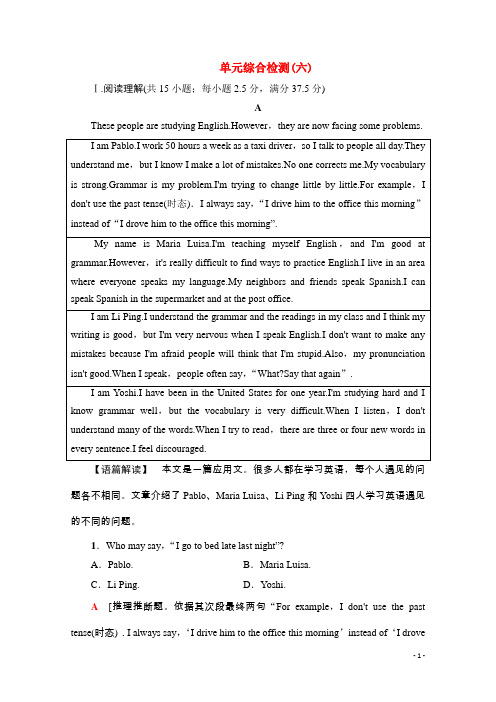
单元综合检测(六)Ⅰ.阅读理解(共15小题;每小题2.5分,满分37.5分)AThese people are studying English.However,they are now facing some problems.【语篇解读】本文是一篇应用文。
很多人都在学习英语,每个人遇见的问题各不相同。
文章介绍了Pablo、Maria Luisa、Li Ping和Yoshi四人学习英语遇见的不同的问题。
1.Who may say,“I go to bed late last night”?A.Pablo. B.Maria Luisa.C.Li Ping. D.Yoshi.A[推理推断题。
依据其次段最终两句“For example,I don't use the past tense(时态).I always say,‘I drive him to the office this morning’instead of‘I drovehim to the office this morning’.”可知Pablo不会运用过去时,题干中“I go to bed late last night”属于过去时时态错误,故A项正确。
]2.What would be the best advice for Maria Luisa?A.Try to have a wide vocabulary.B.Develop a good knowledge of grammar.C.Read as many English books as possible.D.Make friends with Englishspeaking people.D[推理推断题。
依据第三段后三句“I live in an area where everyone speaks my language.My neighbors and friends speak Spanish.I can speak Spanish in the supermarket and at the post office.”可知,Maria Luisa没有讲英语的环境,所以建议让她和讲英语的人交挚友,创建出练习英语的环境。
(人教版)高中英语必修第一册Welcome Unit 单元测试卷(附答案)02
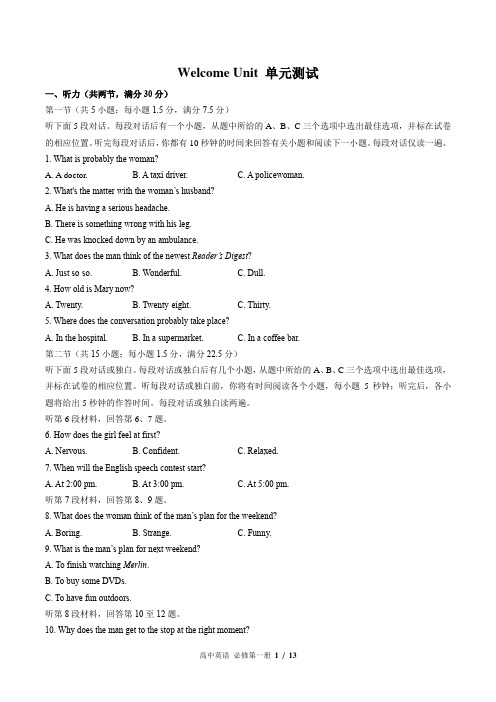
Welcome Unit 单元测试一、听力(共两节,满分30分)第一节(共5小题;每小题1.5分,满分7.5分)听下面5段对话。
每段对话后有一个小题,从题中所给的A、B、C三个选项中选出最佳选项,并标在试卷的相应位置。
听完每段对话后,你都有10秒钟的时间来回答有关小题和阅读下一小题。
每段对话仅读一遍。
1. What is probably the woman?A.A doctor.B. A taxi driver.C. A policewoman.2. What's the matter with the woman’s husband?A. He is having a serious headache.B. There is something wrong with his leg.C. He was knocked down by an ambulance.3. What does the man think of the newest Reader’s Digest?A. Just so-so.B. Wonderful.C. Dull.4. How old is Mary now?A. Twenty.B. Twenty-eight.C. Thirty.5. Where does the conversation probably take place?A. In the hospital.B. In a supermarket.C. In a coffee bar.第二节(共15小题;每小题1.5分,满分22.5分)听下面5段对话或独白。
每段对话或独白后有几个小题,从题中所给的A、B、C三个选项中选出最佳选项,并标在试卷的相应位置。
听每段对话或独白前,你将有时间阅读各个小题,每小题5秒钟;听完后,各小题将给出5秒钟的作答时间。
每段对话或独白读两遍。
听第6段材料,回答第6、7题。
6. How does the girl feel at first?A. Nervous.B. Confident.C. Relaxed.7. When will the English speech contest start?A. At 2:00 pm.B. At 3:00 pm.C. At 5:00 pm.听第7段材料,回答第8、9题。
人教版新教材高一英语welcome unit单元测试练习含答案
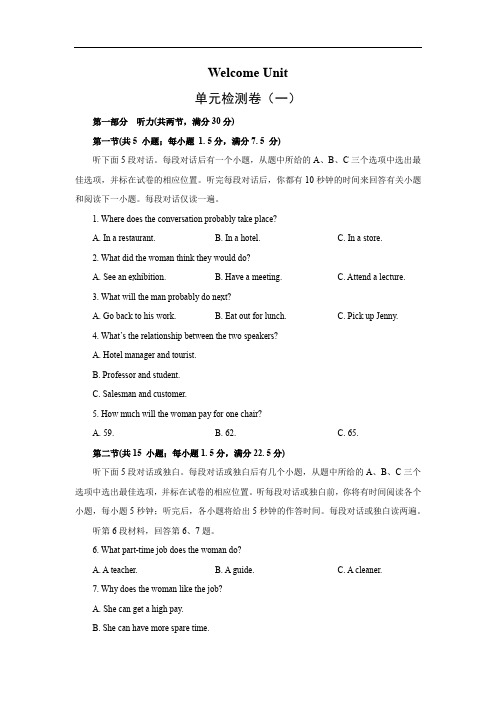
Welcome Unit单元检测卷(一)第一部分听力(共两节,满分30分)第一节(共5 小题;每小题1. 5分,满分7. 5 分)听下面5段对话。
每段对话后有一个小题,从题中所给的A、B、C三个选项中选出最佳选项,并标在试卷的相应位置。
听完每段对话后,你都有10秒钟的时间来回答有关小题和阅读下一小题。
每段对话仅读一遍。
1. Where does the conversation probably take place?A. In a restaurant.B. In a hotel.C. In a store.2. What did the woman think they would do?A. See an exhibition.B. Have a meeting.C. Attend a lecture.3. What will the man probably do next?A. Go back to his work.B. Eat out for lunch.C. Pick up Jenny.4. What’s the relationship between the two speakers?A. Hotel manager and tourist.B. Professor and student.C. Salesman and customer.5. How much will the woman pay for one chair?A. 59.B. 62.C. 65.第二节(共15 小题;每小题1. 5分,满分22. 5分)听下面5段对话或独白。
每段对话或独白后有几个小题,从题中所给的A、B、C三个选项中选出最佳选项,并标在试卷的相应位置。
听每段对话或独白前,你将有时间阅读各个小题,每小题5秒钟;听完后,各小题将给出5秒钟的作答时间。
每段对话或独白读两遍。
听第6段材料,回答第6、7题。
- 1、下载文档前请自行甄别文档内容的完整性,平台不提供额外的编辑、内容补充、找答案等附加服务。
- 2、"仅部分预览"的文档,不可在线预览部分如存在完整性等问题,可反馈申请退款(可完整预览的文档不适用该条件!)。
- 3、如文档侵犯您的权益,请联系客服反馈,我们会尽快为您处理(人工客服工作时间:9:00-18:30)。
单元测试题一. 单项选择1. His job consist ______ helping old people who live alone.A. ofB. inC. withD. at2. ________ Tom and Mary, I think Tom is taller.A. ComparingB. ComparedC. CompareD. Being compared3. ______ with that one, this one is more suitable.A. ComparedB. ComparingC. CompareD. Being compared4. Nearly all the industry of Argentina is ______ in the capital.A. concentratingB. concentratedC. concentratingD. being concentrated5. I hesitate _____ you, but will you recommend me for the post?A. askB. askedC. askingD. to ask.6. Harry was out going that he soon ______ the other children in the kindergarten.A. came up withB. put up withC. fitted in withD. caught up with7. His story agreed _______ the facts.A, with B. to C on D. for8. I think, Tom, rather than all of you, _______ an honest boy.A. is B are C . were D. have been.9. _______ is a fact that English is being accepted as an international language.A. ThereB. This C That D. It10. I knew _____ John Lennon, but not ___________ famous one.A. /; aB. a; theC. /; theD. the; a11. I agree with most of what you said, but I don’t agree with __________.A. everythingB. somethingC. SomethingD. nothing.12. In fact __________ is a hard job for the police to keep order in an impart antmatch.A. thisB. thatC. thereD. it13. Let’s keep to the point or we _______________ any decision.A. will never reachB. have never reached.C. never reach D never reached.14. I tried to avoid _________ him because he always bored me.A. meetingB. to meetC. meetD. to be held15. We need to concentrate resources ________ the most run-down areas.A. toB. onC. inD. with16. They _____ friends since they met in Shanghai.A. have madeB. have becomeC. have beenD. have turned17. It was not until 1920 _____ regular radio broadcast began.A. whileB. whichC. thatD. since18. Mother _____ him to study hard, but it didn’t seem to help.A. hopedB. suggestedC. insistedD. tried to persuade19. Paul doesn’t have to be made_______. He always works hard.A. learnB. to learnC. learnedD. learning20. What ___ great fun it is to have a swim on a hot day in summer.A. aB. theC. /D. of二:完型填空。
(20分)Drawing a picture is the simplest way of putting an idea down on paper. That is 21 men first began to write, six thousand years ago or 22. The alphabet we now use 23 down to us over a long period of time. It was 24 from thepicture-writing of ancient Egypt.Picture-writing was useful in many 25 . It could be used to express ideas as well as 26 .For example, a drawing of a 27 meant the object “man”. 28 a drawing of a man 29 on the ground with a spear in him meant 30 .Besides the Egyptians, the Chinese 31 the American Indians also developed ways 32 writing in pictures. But only 33 much could be said 34 . Thousands of pictures would have been needed 35 express all the ideas that people might have. It would have 36 many thousands more to express all the objects 37 to men. No one could 38 so many pictures in a lifetime. 39 could anyone learn the meaning of all 40 drawings in a lifetime.()21.A.when B.because C.where D.how()22.A.over B.more C.else D.later()23.A.went B.showed C.appeared D.came()24.A.developed B.discovered C.increased D.grown()25.A.sides B.colors C.ways D.meanings()26.A.stories B.animals C.objects D.subjects()27.A.creature B.being C.woman D.man()28.A.But B.For C.After D.Because()29.A.lies B.lying C.laying D.lain()30.A.“die”B.“death”C.“sleep”D.“down”()31.A.and B.with C.helped D.followed()32.A.to B.about C.on D.of()33.A.not B.very C.so D.too()34.A.as follows B.this way C.that much D.at least()35.A.to B.for C.possibly D.actually()36.A.written B.circled C.done D.taken()37.A.known B.with C.called D.in()38.A.write B.draw C.watch D.take()39.A.Either B.So C.Nor D.Also()40.A.many B.some C.that D.such三、阅读理解(20分)AIt doesn't matter when or how much a person sleeps, but everyone needs some rest to stay alive. Th at’s what all doctors thought, until they heard about Al Herpin. Al herpin, it was said, never slept. Could this be true? The doctors decided to see this strange man themselves.Al herpin was 90 years old when the doctors came to his home in New Jersey. They thought for sure that he got some sleep of some kind. So they stayed with him and watched every movement he made. But they were surprised. Though they watched him hour after hour and day after day, they never saw Herpin sleeping. In fact, he did not even own a bed. He never needed one.The only rest that Herpin sometimes got was sitting in a comfortable chair and reading newspaper. The doctors were puzzled by this strange continuous sleeplessness. They asked him many questions, hoping to find an answer. They found only one answer that might explain his condition. Herpin remembered some talk about his mother having been injured several days before he was born. But that was all. Was this the real reason? No one could be sure.Herpin died at the age of 94.()41.The main idea of this passage is that _________.A.large numbers of people do not need sleepB.a person was found who actually didn’t need any sleepC.everyone needs some sleep to stay aliveD.people can live longer by trying not to sleep()42.The doctors came to visit Herpin, expecting _________.A.to cure him of his sleeplessnessB.to find that his sleeplessness was not really trueC.to find out why some old people didn’t need any sleepD.to find a way to free people from the need of sleeping()43.After watching him closely, the doctors came to believe that Al Herpin _________.A.needed some kind of sleep B.was too old to need any sleepC.needed no sleep at all D.often slept in a chair()44.One reason that might explain Herpin’s sleeplessness was _________.A.his mother’s injury before he was bornB.that he had gradually got rid of the sleeping habitC.his magnificent physical conditionD.that he hadn’t got a bed()45.Al Herpin’s condition(情况) could be regarded as _________.A.a common one B.one that could be curedC.very healthy D.a rare(稀有的,罕见的) oneBMr and Mrs Smith had always spent their summer holidays in New Jersey in the past, staying in a small inn(旅店) at the foot of a hill. One year, however, Mr. Smith made a lot of money in his business, so they decided to go to London and stay at a really good hotel while they went touring around that famous city.They flew to London and arrived at their hotel late one evening. They expected that they would have to go to bed hungry, because in that small inn in New Jersey, no meals were served after seven. They were therefore surprised when the man who received them in the hall asked whether they would take dinner there that night.“Are you still serving dinner?” asked Mr Smith.“Yes, certainly, sir,” answered the man. “We serve it until half past nine.”“What are the times of meals then?” asked Mr Smith.“Well, sir,” answered the man, “We serve breakfast from seven to half past eleven in the morning, lunch from twelve to three in the afternoon, tea from four to five, and dinner from six to half past nine.”“But that hardly leaves any time for us to see the sights of London!” said Mrs Smith.()46.Mr and Mrs Smith _________ in the past.A.had often stayed in a big hotel in New JerseyB.had traveled to many placesC.had often stayed in a small innD.had made a lot of money()47.They decided to go to a really good hotel because _________.A.it was famousB.it was difficult to find a cheap hotelC.it was near many interesting placesD.they now had enough money()48.When they arrived at the hotel, they found _________.A.no meals were served after sevenB.dinner was still being servedC.their plane had arrived too lateD.they had to go to bed hungry()49.When the man told them the times of meals at the hotel, Mrs Smith felt _________.A.disappointed B.excited C.delighted D.satisfied()50.Mrs Smith _________.A.thought she would have plenty of time to see the sightsB.was afraid they would have no time to tour around LondonC.thought the hotel was not as good as the small innD.thought the hotel was much better than the small inn for its good mealsCTim Berners-Lee, who received one million euros ($1.2 million) cash for creating the World Wide Web, says he would never have succeeded if he had charged money for his inventions.“ If had tried to demand fees…there would be no World Wide Web,”Berners-Lee, 49, said on June 15 at a ceremony (仪式) for winning the first Millennium T echnology Prize, awarded by the Finnish Technology Award Foundation. “There would be lots of small webs,” The prize committee agreed.The Internet had existed for nearly 20 years when Mr Berners-Lee launched(推出) the world’s first website in August, 1991.But the Net was little more than a collection of computer connected with cables. It didn’t have a means (way) of sharing information between different kinds of computers running different kinds of software. Mr Berners-Lee found ways to connect documents and other information using hypertext links. The universal hypertext language he created allows all kinds of software to communicate with(与……交流) each other. His creation(创造) made a generation of youthful millionaires and millionaires, lit the spark(火花) for the New Economy and paved the way for(为…铺平道路) great new industries such ase-commerce.The invention could have made him unbelievably wealthy (rich), even by Internet standards. But Berners-Lee’s never devoted to commercialize(使商业化)or patent(取得…专利) his contributions(贡献) to the Internet technologies he had developed. Berners—Lee, who is originally from Britain, has mostly avoided both the fame and the fortune won by many of his Internet colleagues. Despite his prize, he remained modest(谦虚的) about his achievements. “I was just taking lots of things that already exited and added a little bit,” said Berner—Who now runs the standard-setting World Wide Web Consortium from office at Massachusetts Institute of Technology.“Building the Web, I didn’t do it all myself,” he said. “The really exciting thing about it is that it was done by lots and lots of people, connected with this great spirit.”Berners-Lee indeed took concept(观念)that were well known to engineers since the1960s, but it was he who saw the value of marrying them. Pekka Tarjanne, chairman of the prize committee, said “no one doubts who the father of the World Wide Web is, except Berners-Lee himself.51. Before the World Wide Web was invented, the Internet________.A.was already in wide use.B. was used to share informationC. was of little practical useD. didn’t exist for long.52. From the passage we can conclude that Tim Berners-Lee is________.A modest(谦虚的)and unselfish(无私的) B。
